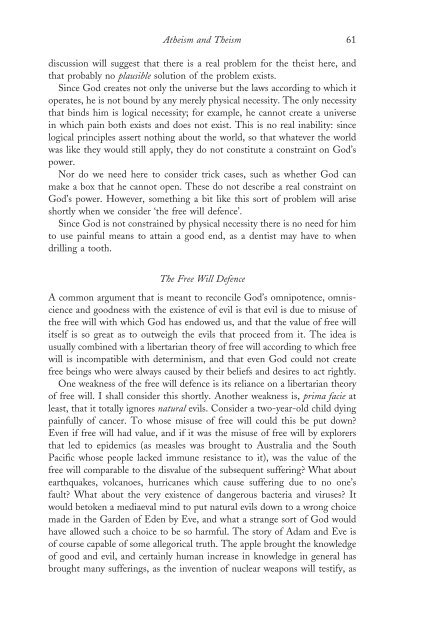Atheism and Theism JJ Haldane - Common Sense Atheism
Atheism and Theism JJ Haldane - Common Sense Atheism
Atheism and Theism JJ Haldane - Common Sense Atheism
Create successful ePaper yourself
Turn your PDF publications into a flip-book with our unique Google optimized e-Paper software.
<strong>Atheism</strong> <strong>and</strong> <strong>Theism</strong> 61<br />
discussion will suggest that there is a real problem for the theist here, <strong>and</strong><br />
that probably no plausible solution of the problem exists.<br />
Since God creates not only the universe but the laws according to which it<br />
operates, he is not bound by any merely physical necessity. The only necessity<br />
that binds him is logical necessity; for example, he cannot create a universe<br />
in which pain both exists <strong>and</strong> does not exist. This is no real inability: since<br />
logical principles assert nothing about the world, so that whatever the world<br />
was like they would still apply, they do not constitute a constraint on God’s<br />
power.<br />
Nor do we need here to consider trick cases, such as whether God can<br />
make a box that he cannot open. These do not describe a real constraint on<br />
God’s power. However, something a bit like this sort of problem will arise<br />
shortly when we consider ‘the free will defence’.<br />
Since God is not constrained by physical necessity there is no need for him<br />
to use painful means to attain a good end, as a dentist may have to when<br />
drilling a tooth.<br />
The Free Will Defence<br />
A common argument that is meant to reconcile God’s omnipotence, omniscience<br />
<strong>and</strong> goodness with the existence of evil is that evil is due to misuse of<br />
the free will with which God has endowed us, <strong>and</strong> that the value of free will<br />
itself is so great as to outweigh the evils that proceed from it. The idea is<br />
usually combined with a libertarian theory of free will according to which free<br />
will is incompatible with determinism, <strong>and</strong> that even God could not create<br />
free beings who were always caused by their beliefs <strong>and</strong> desires to act rightly.<br />
One weakness of the free will defence is its reliance on a libertarian theory<br />
of free will. I shall consider this shortly. Another weakness is, prima facie at<br />
least, that it totally ignores natural evils. Consider a two-year-old child dying<br />
painfully of cancer. To whose misuse of free will could this be put down?<br />
Even if free will had value, <strong>and</strong> if it was the misuse of free will by explorers<br />
that led to epidemics (as measles was brought to Australia <strong>and</strong> the South<br />
Pacific whose people lacked immune resistance to it), was the value of the<br />
free will comparable to the disvalue of the subsequent suffering? What about<br />
earthquakes, volcanoes, hurricanes which cause suffering due to no one’s<br />
fault? What about the very existence of dangerous bacteria <strong>and</strong> viruses? It<br />
would betoken a mediaeval mind to put natural evils down to a wrong choice<br />
made in the Garden of Eden by Eve, <strong>and</strong> what a strange sort of God would<br />
have allowed such a choice to be so harmful. The story of Adam <strong>and</strong> Eve is<br />
of course capable of some allegorical truth. The apple brought the knowledge<br />
of good <strong>and</strong> evil, <strong>and</strong> certainly human increase in knowledge in general has<br />
brought many sufferings, as the invention of nuclear weapons will testify, as

















